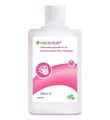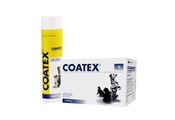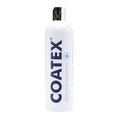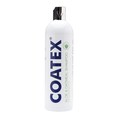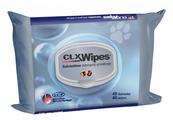Winter weather has well and truly arrived, which means dry flaky skin, dull coats and mud-matted hair for our dogs and outdoor cats. Strong, chilly winds, frequent downpours and cold temperatures can be very damaging to the skin and coat, as can stuffy central heating that’s on longer (and hotter!) during the winter months.
This sudden switch from cold to warm affects the skin’s moisture levels and the natural balance of bacteria on the skin. It can also be uncomfortable moving from chilly to humid, and damp to dry.
Although we can’t prevent the cold and adverse weather, there is plenty we can do to help minimise its harmful effect. It is especially important that we maintain good grooming practices throughout winter and aim to keep our pets as warm and dry as possible.
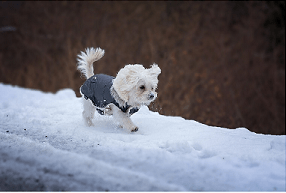
Below are our ‘top tips on weather-proofing your pet’ and protecting the skin and coat from damage:
- As well as paying close attention to the coat, winter weather can be particularly hard on the paws, which take the brunt of conditions on wet and muddy walks. Add to this salt-gritted paths and anti-freeze – the paws have a tough job to perform! Mud and snow can also become compacted between the toes which causes irritation, cracked skin and abrasions.
- Rubber boots provide a physical barrier against these things, as well as giving your dog added grip on the paths. They are particularly helpful for dogs with sensitive skin and mobility issues. A nourishing paw butter can also be used to help keep the paws supple and prevent chapping.
- When it comes to maintaining the coat, you want to be bathing your pets as little as possible. Cats don’t need bathing as they do a wonderful job of grooming themselves. Although only occasional bathing may seem counter-intuitive during the messiest, muddiest months, frequent wetting and drying of the skin is damaging and needs to be avoided as much as possible.
- Obviously if your dog is caked in mud, washing him is the most sensible option, but try to use a gentle moisturising or oatmeal shampoo and rinse thoroughly with lukewarm water. If possible, leave the mud to dry off before brushing it out, or use a dry shampoo which cleans and freshens without requiring water. A simple dog coat might be enough to combat the worst of the weather.
- Aim to brush your dog/outdoor cat every day, especially after a winter walk. Longer, fluffier coats are more likely to get matted and will probably necessitate more frequent grooming. Daily brushing will help remove mud and debris and allow you to check for skin complaints and parasites.
- If your dog or cat has long hair and drop ears, it might be prone to ear problems. A simple everyday cleaner like RestAural will help maintain healthy ears by removing ear wax and discharge, drying the ear canal to eliminate moisture and prevent bacterial build-up, and acidifying the ear to balance its natural pH.
- Diet and nutrition is key to a healthy skin and coat. Speak to your vet about introducing a nutritional supplement to your pet’s diet, such as Yumega for dogs and cats. The inclusion of omega oils can help support the skin through winter and promote a healthy, glossy coat. If the skin is dry or itchy, it will also help soothe these uncomfortable symptoms.
If you have any further advice on winter grooming, please get in touch so we can add it to our list! Either comment here or email me directly: [email protected]
Written by: Hannah


